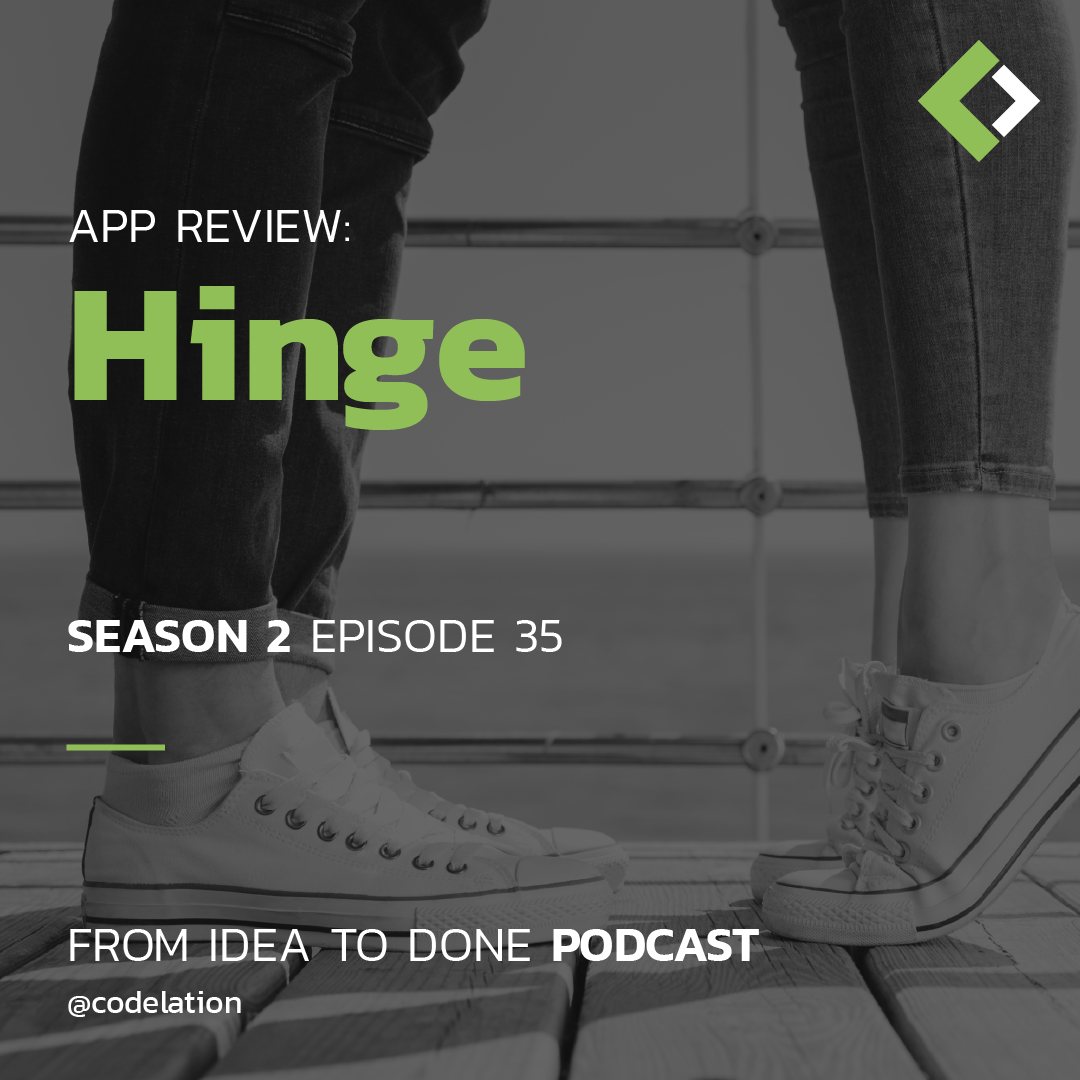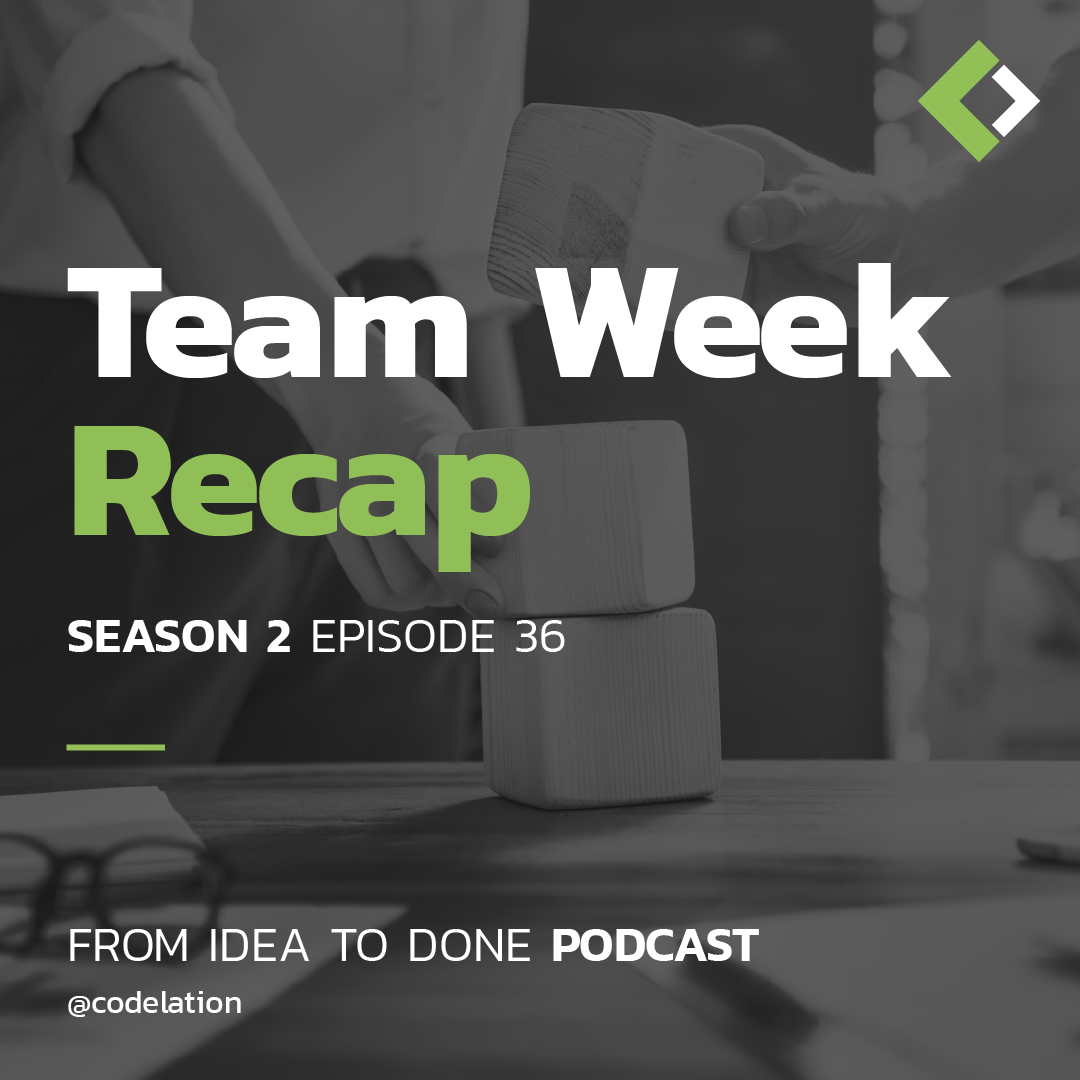Team Week Recap

App Review: Hinge
September 1, 2020
Agile Policies
September 15, 2020VO: Get ready for your semi-regular dose of random ideas from the guys at codelation. We like to talk about big ideas companies that are winning, and those that aren't along with current events in our crazy world of software startups. So come along with Erick and Josh, who challenge you to think big, start small and turn your ideas into something on this episode of, from idea to done.
Josh: Hi everyone I'm Josh
Erick: And I'm Erick and today's idea are what are the next steps after team building week? And so a little backstory. This is, we had all of our remote guys kind of come in last week and we had some goals kind of going into the week and I just kind of wanted to chat with you and see where we're at with everything. So the first goal we had was to give everyone a better understanding of what each other does.
Josh: No, I thought we, we accomplished this and, um, I liked the ability for everyone to get into a socially distance room and really work through some project work. And some of the, some of the stuff that, um, I thought really helped pull that out was more of the cultural pieces than the actual work itself, you know, like the strength finders and having some facilitation from the small type people to help us really talk through it and, and say what, what this means to us as a team.
Erick: Yeah. And I think it did a good job of kind of just teaching all the nerds. All this stuff goes in the work that we're doing outside of their just kind of day to day stuff. And it was good for them to be around us when we're recording and kind of get a better understanding of why I asked them to be quiet when we recorded this thing. And so, yeah, the second one on our list was just to build a stronger than zoom slash slack, internal team relationships
Josh: With, you know, having remote team members. It's good to actually have met someone and know what they are doing and how they work. Um, that's something that's tough to do on zoom because it's, if you're not in the office, you don't, you don't get that feel of, okay, Tyson's going heads down on some design elements or next meeting with a client that just kind of happens behind the scenes and even, you know, team members that have worked together for a year, but never personally met, I think as a, as a big, um, is a big win. Um, it's really tough to get that understanding when someone's halfway across the country,
Erick: You know, and I think as a person like me, who's the one super extrovert on our team that has been going crazy and all of this zoom COVID evolution of business, like how there is just something that is completely different about just the energy in a room. And I'm gonna kind of be a hippie there, but you just get a feel for that person. And it's just, it's just completely different meeting max you, one of our good customers in person with the person that's been working on their sites and some of their stuff for the past, you know, year or since I've been here and I they've never met each other. And I think that that was kind of special and that was kind of important. And so yeah, some of the feedback I got from the team to have introvert this isn't just me is it's been pretty positive. The third thing I wanted to do in our week or goals was, you know, update our own website, um, improve our process while we're doing that and get a nice working system in place for when after this, after that week, we can take that to other customers with our web belts.
Josh: Yeah. I, I don't think we would've gotten to where we did if we would have been remote the entire time. Um, the, the one thing I think we could have done better. And I think we learned from this is that we had a lot of events kind of in the morning and throughout the day, and that kind of broke up our workdays. And I think it was your recommendation recommendation. Eric is to move the cultural stuff to one side of the week and the work stuff to the other side of the week. So we'd have more dedicated time with the team. Um, but I thought overall it was a good process,
Erick: You know, it's definitely, and that's not just for me when I sent out kind of the feedback form that was kind of a work felt too condensed and you couldn't really get into anything, but most of the stuff we did was really good. And so, yeah, I think when we look at this next time, I would break it up into, you know, hippie team building days and then like nose down kind of work together days. And so, yeah. Um, but at the same time going bringing everyone in and seeing that process it's really started to move us, I think, in the right direction. So the next goal I had was to make our website awesome slash aligned with our marketing strategy and team.
Josh: You know, I think the win here is that, um, we're not just looking at making something functional anymore, but that also needs to solve a business problem. And I think the team has a better understanding or grasp of, you know, what it means for us to put two weeks into something and how expensive that can get for the customer and that we need to focus on the business problem first and really make sure we're solving that. Cause at the end of the day, nobody wants to buy a website, right? Like you never wake up going, I can't wait to buy a website today. I can't wait to buy an app. What they want is the outcome of it. And if we can focus more on the outcomes and that business problem, that's where we win.
Erick: Oh man, I, I can't into like a dreamy world of like, if people were like, oh, I wish I had an app today. How much easier my job someone really wanted. And realistically, the people that we talked to, they, they want to solve a problem. And I think when we're trying build really nice stuff, we as kind of a craftsman put on the blinders and don't look at in terms of like real money. But then when we said, okay, this is what payroll was this week. This is how many hours we put into it. This is how much we would charge someone for as nice of product as we made. It was kind of eyeopening, I think for everyone. And I know marketers get really dreamy with like, oh, let's just make the prettiest best things and money doesn't end. I'm like, oh God, that costs Josh like actual thousands of dollars to make, to implement a video like Custer or on our case studies phages, like, okay, we got to start thinking about things differently, especially when it comes to our customers, which I think that, that totally just opened our eyes. And I know we had a lot of stuff crammed into that week, but with our updated process is I'm comfortable taking that to other businesses going forward. And so the last thing that I wanted to do was have everyone just be like optimistic and energized about the rest of this crappy year, you know, and just, just feeling good about where we're at in like the overall future of our company.
Josh: I enjoyed really kind of, um, being able to talk about our north star and, you know, some of the stuff that came came out of the culture events, um, you know, things like talking about a craftsmanship culture and really trying to look at things a little differently was, was really great. And, you know, I was honestly surprised about how a little afternoon do you'll play video games with the team really, really got everyone kind of loosened up and talking with each other. And it was just, it was a fun time
Erick: And getting everyone comfortable with each other, that was the most important thing to me. And this goal was this was a trial. And I think the best way to move forward is with anything is, you know, see what goes wrong and pick yourself up and then learn from this and then grow. And, and I think that this year is expedited a lot of growth across the world, but I'm pretty excited after leaving that week just for, you know, the rest of this year and beyond, I feel like we have just some nice momentum going in time where that's not the case for a lot of companies. And so did you have kind of any final thoughts from an owner, um, on this week? I know that money isn't everything, but there was a, a real expense to this.
Josh: Yeah. I mean, when you, you talked about flying people in and hotel rooms and you know, not working on client facing work, you know, that's, that is a real expense and there's, um, lost revenue opportunities. But I think at the end of the day, if, if we took, you know, if we lost $20,000 of revenue opportunity and spent $5,000 in hard costs, can we make that back up inefficiencies and working better as a team this next quarter? And I would bet that we could. And so I, I would challenge, you know, any, any, um, founder leader, how are whatever you want to look at yourself and your business, the saying double down into your, your people in your team and, um, make sure that you're being strategic about it. So thank you, Eric, for pulling this together and also is a lot on you. And, um, I think the next one we do is we're going to be able to take a lot of our lessons learned and making it better than our first one. This first one was awesome.
Erick: Yeah, no, I, it was one of the most stressful and exhausting slash exciting slash rewarding week of my entire career. And so until next time we do this, um, thank you for listening. We're hoping you know, of a startup that could use our advice and random thoughts, send them over to codelation-bedrock.flywheelstaging.com to you. The next podcast.
Sign up to receive email updates
Enter your name and email address below and I'll send you periodic updates about the podcast.
